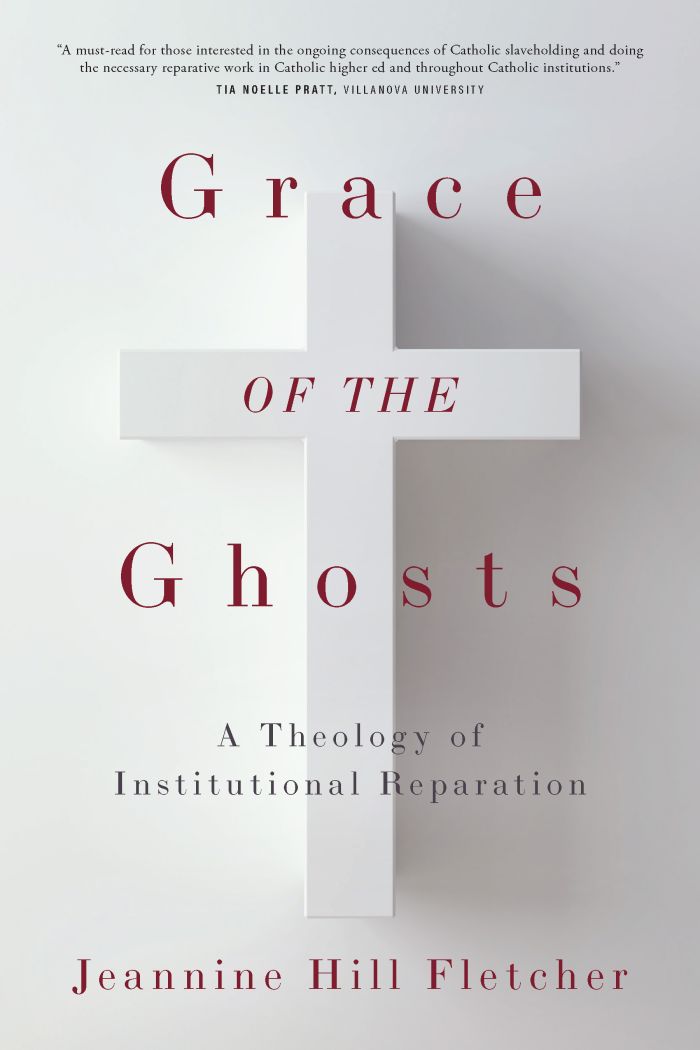Grace of the Ghosts
A Theology of Institutional Reparation

This book can be opened with

A profound new volume that reckons with the history of an American Catholic Church embedded in and drawing benefits from White supremacy
For the Church to become a truly anti-racist institution, we must first understand how today’s racial challenges are embedded in the theo-logic of American Christianity and the cultural production of our Christian educational institutions. As colleges and universities reckon with their involvement in slavery, Grace of the Ghosts asks Christian-affiliated institutions (of congregation, school, and media) to expand this reckoning with attention to the many ways they have been embedded in and drew benefits from American systems of White supremacy.
Too often, White Christian histories render White Christians as the “good guys” in order to make a brutal history plausible and thus erase countless injustices committed against Indigenous, Black, Latinx, and Asian peoples. Author Jeannine Hill Fletcher writes instead a US Catholic history that sheds light on the crimes committed against these ancestors by members of their own faith community. Grace of the Ghosts focuses on specific case studies of Catholic educational and ecclesial institutions, journeying through numerous microhistories to provide an accessible program to work toward the flourishing of a multiracial and multicultural Church. Hill Fletcher digs deeply into the details of Jesuit slaveholding at Georgetown, the expansion of Church networks on the frontiers to the West and South and emergent cities to the North, and the extension of the work of religious women from the East Coast to the Midwest. The volume considers the implications of Catholic involvement in Indian Boarding Schools and envisions alternative possibilities in the Catholic activism of the United Farmworkers. Each microhistory elevates the theological insights that emerge from those who withstood the assaults of White Christian supremacy. Hill Fletcher then orients the reader forward by envisioning possibilities of repair. Recognizing that this will require extensive and ongoing work, the book closes with the consideration of spiritual capital (including a reclamation of Ignatius’s Spiritual Exercises) that might sustain us as we write the next chapter in the nation’s long struggle against White supremacy.
Much work must be done for reparation, reconciliation, and repair to unfold fully. Grace of the Ghosts provides a bridge to institutional accountability for past failings and a path toward becoming transformative institutions for the future.
The significance of history for Catholic theology in the United States cannot be overestimated. Too often and too eagerly we accept an uncritical and romantic historical narrative that treats Catholics as ‘recent’ or nineteenth century European immigrants and, as such, had little to do with the cruel dispossession and disruption of the lives of Indigenous peoples or the brutal enslavement and continuing oppression of African-descended peoples. Jeannine Hill Fletcher interrogates our history, unmasks our putative innocence, and encourages us all to reach out to accept the grace-filled solidarity of the dead who continue to care for us and for this land.—M. Shawn Copeland, professor emerita, Boston College, Chestnut Hill, MA
Dr. Hill Fletcher offers Catholics a way through a deeply traumatic history, illuminating how the Roman Church can account for its failings of the past is still with us today and of urgent concern for us all.—Philip P. Arnold, Syracuse University, author of The Urgency of Indigenous Values
Dr. Hill Fletcher’s stellar book projects existing historical knowledge through a theological lens, thus, giving the reader a new perspective, creating a new theology, and opening a critical discussion of systemic racism and white supremacy to new constituencies. Dr. Hill Fletcher deftly offers a nuanced treatment of history to create new theology. This is a must-read for those interested in the ongoing consequences of Catholic slaveholding and doing the necessary reparative work in Catholic higher ed and throughout Catholic institutions.—Tia Noelle Pratt, Assistant Vice President and Director of Mission Engagement and Strategic Initiatives, Villanova University
In Grace of the Ghosts, Jeannine Hill Fletcher contends with the religious history of white supremacy and its consequences. Drawing on the work of Indigenous scholar Maria Yellow Horse Brave Heart, the book calls us to reckon with all of our ancestors, the communion of saints and sinners alike. In so doing, Hill Fletcher provides a roadmap for the holy work of truth-telling, reparations, and healing that is necessary to build a truly anti-racist, multicultural Church--work she invites us to undertake "enveloped by the grace of the ghosts."—Matthew J. Cressler, creator of the webcomic series Bad Catholics, Good Trouble ©
I'm grateful that Jeannine Hill Fletcher has undertaken this work. In weaving together history, theology, politics, and spirituality, she challenges our understanding of white supremacy and its pervasive legacies within the Catholic church. As a Catholic school leader, Hill Fletcher challenges me to examine how the acquisition of land and property which make up our schools was acquired and how the capital acquired to sustain our schools has also been gained. As our Catholic schools become increasingly more tuition-driven, her analysis is a timely reminder to interrogate our admission priorities and whether or not our schools are aspiring to be reflective of the Church we are.—Timothy Uhl, Principal of Notre Dame High School in Salinas, California, and editor of A Brighter Future for Catholic Schools: Innovation & Opportunity
. . .Discusses how Catholic institutions can repair harms wrought by their historical ties to white supremacy, including slaveholding at Georgetown University and forced assimilation at Indian Boarding Schools.—Publishers Weekly
Hill Fletcher is on solid ground with her latest effort. Grace of the Ghosts is a provocative follow-up to her 2017 book, The Sin of White Supremacy, in which the author defines white supremacy as an ideology rationalizing the material dispossession of non-white people.—National Catholic Reporter
A useful volume for those interested in American Catholicism and the history of slavery—Choice Reviews
I recommend this book to the various stakeholders of our ecclesial and educational settings (students, educators, administrators, parishioners, and pastors). Knowing, analyzing, and sharing our histories is as important as ever if we are to transform our present-day realities.—Alexis Larios, American Catholic Studies
Introduction | 1
1 Truth Telling about Institutions | 7
2 Sucky’s Scream: Hearing the Ghosts and Heeding Their Call | 38
3 The Complexity of a Complicit Church: Henrietta and Elizabeth in a Catholic Network | 78
4 Institutional Networks and Nation Building:
Collaborating with the State through Systems of Education | 126
5 Leveraging Capital: Church Institutions for Change in the Twentieth Century | 168
6 Confronting a Culture of White Supremacy: Spiritual Strength for Mobilizing Capital | 211
Acknowledgments | 255
Notes | 257
Bibliography | 297
Index | 315




